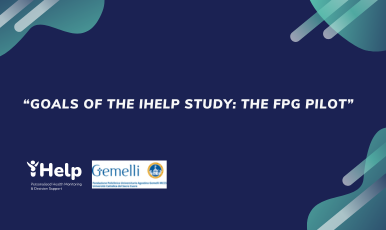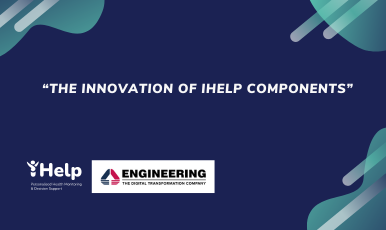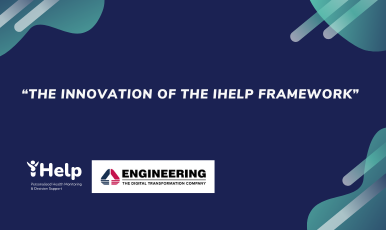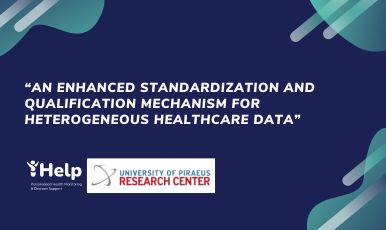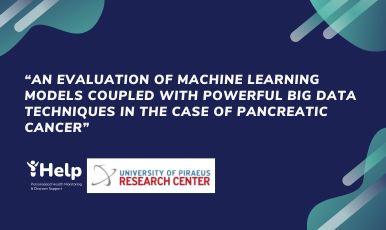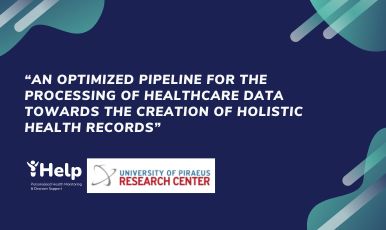The main goals of the iHelp project are to early detect and mitigate the risks associated with Pancreatic Cancer by applying advanced Artificial Intelligence (AI)-based techniques.
Pancreatic cancer is considered a rare disease with a high mortality rate. Knowing how to timely prevent, diagnose and treat such a disease is crucial for a person’s well-being. Unfortunately, treatments may impact the quality of life of the patient and expose the patient to the risk of toxicity.
Fondazione Policlinico Universitario “A. Gemelli” IRCCS (FPG) and Gemelli Generator RWD, take part in the development and testing of the iHelp framework. Specifically, FPG is involved in Pilot 2: “Interventional Monocentric Study based on Patient-Reported Outcomes”, with the aim of defining personalized therapeutic strategies that can maximize their efficacy, reduce the risks of offside effects in patients affected by Pancreatic Cancer, and bring significant improvements in terms of Quality of Life (QoL) of high-risk individuals.
Considering the flexibility and generalizability of the decision support suite developed in iHelp, our clinicians asked to extend this approach to two additional pathologies: anal canal and prostate cancer. This extension will allow the study to achieve two goals:
- A higher number of patients can be involved and will benefit from the study, by being monitored via a dedicated wearable as well as frequently answering questions related to their health status;
- Further validation of the iHelp project and the developed platform, in order to give HPCs a tool that can support them in the clinical routine and that could be applied to other pathologies.
Patients diagnosed with the anal canal, prostatic or pancreatic cancer and corresponding to the inclusion criteria are currently being involved in a prospective study. A real-world data analysis based on the clinical records and secondary data (from a mobile app and a wearable) will give insight into their QoL and treatment toxicities.
Meet the FPG’s working group:
Professor Vincenzo Valentini, MD, Director of the Department of Radiology, Radiation Oncology, Hematology. Author of more than 450 publications in peer-reviewed international journals, and member of the editorial board of several national and international radiotherapy journals. He promoted the development of the Knowledge-Based Laboratory, devoted to data mining, process mining, distributed rapid learning, radiomics, AI in health, and health Big Data. He contributed to the accomplishment of the Gemelli ART (Advanced Radiation Therapy), a high-tech radiotherapy center, hosting the beauty of Rome art to offer relief and empowerment to the patients.
Luca Tagliaferri, MD, Head of Interventional Radiotherapy Unit – Referent of Interventional Oncology Center. Author of more than 150 papers published in international scientific journals with impact factor and indexed on Pubmed, Scopus, or WOS. The scientific activity is mainly focused on interventional and metabolic radiotherapy, especially in the field of head and neck, skin, gynecological and prostate cancers. Dr Tagliaferri became Chair of the Head & Neck and Skin GEC-ESTRO Working Group in 2018. He is a member of the GECESTRO committee.
Stefania Manfrida, MD, working at the Radiation Oncology Department of Fondazione Policlinico Universitario A. Gemelli IRCCS since 2001. She focused her interest on the treatment of gastrointestinal neoplasms, metastatic disease, integration of radiochemotherapy, management of acute toxicities during cancer treatment, and application of Innovative Technologies (VMAT, IGRT, SBRT). Author of more than 40 papers published in international scientific journals with impact factor and indexed on Pubmed and Scopus Dr. Manfrida is a member of the Italian Society of Radiation Oncology (AIRO) and the European Society of Radiation Oncology (ESTRO).
Anna Rita Alitto, MD, Ph.D., working at the Radiation Oncology Department of Fondazione Policlinico Universitario A. Gemelli IRCCS since 2014. She focused her interest on the treatment of prostate and genito-urinary cancers, including management of systemic therapies, research of integration between different patients’ data and treatment modalities to predict outcomes, IGRT and SBRT. She is actively involved in profit and no-profit trials on prostate and genitourinary cancers. Author of more than 30 papers published in international scientific journals with impact factor and indexed on Pubmed and Scopus, Dr. Alitto is a member of the Italian Society of Radiation Oncology (AIRO) and of the European Society of Radiation Oncology (ESTRO).
Dr. Patrizia Cornacchione, Radiation Therapist. Currently Ph.D. student in Oncological Sciences at Università Cattolica del Sacro Cuore, she works at Gemelli ART (Advanced Radiation Center) of the Gemelli University Hospital of Rome as Chief of the Medical Physics technologist team and contact person for the management of programming activities in the Interventional Oncology Center. Dr. Cornacchione worked has radiotherapy radiographer since 2004 and in recent years has also focused her main activities in Interventional Radiotherapy (Brachytherapy). She is the author of papers published in international scientific journals and currently is President of the Italian Association of Radiation Therapy and Medical Physics Technologists (AITRO).
Prof. Sergio Alfieri, MD, is the Director of the Digestive Surgery Complex Operative Unit and of the Pancreas Surgical Center and Colon-Rectal Center Coordinator of the Fondazione Policlinico Universitario Agostino Gemelli IRCCS. He is Full Professor of General Surgery at the Università Cattolica del Sacro Cuore. He is the Director of the Master in Oncological Digestive Surgery and the Master in Robotic and Digital Surgery of the Università Cattolica del Sacro Cuore. He is a founding member of EARCS (European Academy of Robotic Colorectal Surgery). He is a member of the European advisor board for “Education guidelines for robotic colorectal surgery“. He is the Author of over 600 publications, with an H-index 30. He has performed more than 10,000 surgeries, of which 8,000 as the first operator (1,000 laparoscopic and 300 robotic).
Giuseppe Quero, MD, is a full-time attendant surgeon and assistant professor (fascia A) at the Digestive Surgery Unit and Colorectal Surgery Center of “Fondazione Policlinico Agostino Gemelli IRCCS” of Rome. Since his residency program, he focused his surgical activities on the treatment of benign and malignant gastrointestinal diseases. His interest in the research has been refined by a research fellowship at IHU/IRCAD of Strasbourg in the years 2016-2017. During this period, he focused his works on both pre-clinical and clinical projects, with a particular interest in translational research. In 2017, Dr. Quero won the Young Investigator Training Program Award (Italian Society of Surgery) with the ongoing project Virtual Reality: exploration and pre-operative planning. Recently, he has been involved as an expert in the ERC project “Laser Optimal” (prof. Saccomandi). In addition, he is one of the members of the Institutional Translational Board of the “Fondazione Policlinico Agostino Gemelli IRCCS” of Rome. He is the author of almost 100 articles published in peer-reviewed journals with an H-index of 16.
Roberta Menghi, MD, is a full-time attendant surgeon and assistant professor at the Digestive Surgery Unit and Colorectal Surgery Center of “Fondazione Policlinico Universitario Agostino Gemelli IRCCS” of Rome. Since her residency period, she focused her surgical formation and scientific papers on minimally invasive approaches in benign and malignant gastrointestinal diseases, in particular robotic procedures. She spent a fellowship period concerned colo-rectal robotic surgery and Pancreatic robotic surgery in England at Queen Alexandra Hospital/ Portsmouth and in Italy at Borgo Trento/Verona, respectively. She is the author of 40 articles published in peer-reviewed journals for an H-index of 11.

